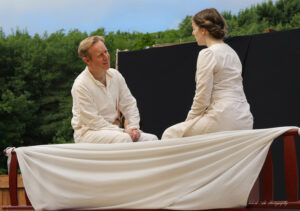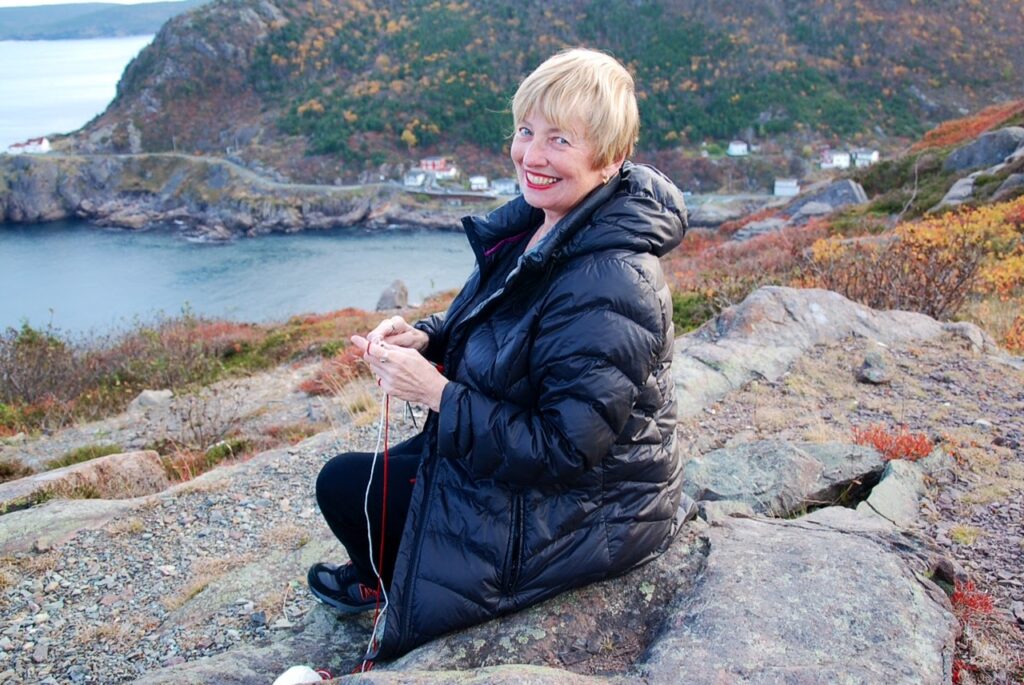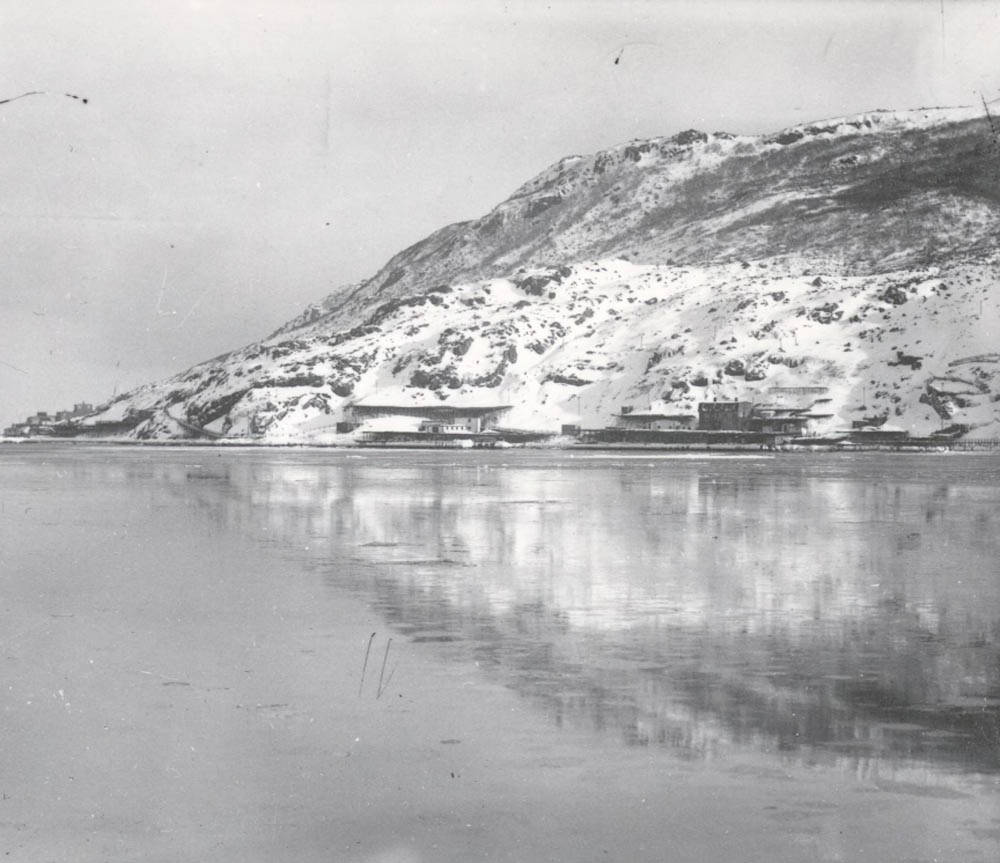“Four actors on stage, a table, four chairs, and a bedsheet”: Robert Chafe’s Tempting Providence at Perchance Theatre
August 2024
NQ spoke with Una Hill-McMullin, who plays nurse Myra Bennett, and Colin Furlong, who plays Angus Bennett.
Una Hill-McMullin. Myra Bennett came from England in 1921, to Newfoundland, to Daniel’s Harbour, to do the very rural, remote kind of nursing work [she was] sent over to do. Myra was only supposed to have a two-year contract, and she stayed for the rest of her days. And continued to work and help everyone from Daniel’s Harbour and up and down the coast, Bonne Bay, Rocky Harbour.
Colin Furlong. Angus is local to Daniel’s Harbour, and he’s a well-travelled individual, he was a merchant marine in the First World War. So he has returned to Daniel’s Harbour, at the point we pick up the story Angus is not that long home from the war and he’s opened up a store locally and is just kind of trying to figure out what the rest of his life is going to look like. And then, one day, the nurse shows up, and sends his life in a new trajectory.
Director Jillian Keiley is known for her unique, highly kinetic style. Does this kind of theatre bring extra challenges, or put extra tools in your kit, or both?
UH. I really appreciate how physical you are, it’s not just a come on stage, speak your words, and leave again. You and your set pieces and your fellow actors are all very physical with each other. Not aggressively so but it is very paramount to the play that there is a great deal of movement to it, and it’s wonderful for me as an actor because I like getting things in my body more, and that helps a lot.
CF. In terms of working with Jillian and Robert I’ve been really lucky, they were actually teachers of mine for a semester when I was at theatre school in 2005. Being taught by them, I learned their style of theatre as part of the curriculum, and then was lucky enough to work with Artistic Fraud many times over the years. I’ve been doing this show since 2014. I really enjoy choral work anyway, I do love working this particular style because anyone who sees Tempting Providence it’s a very precise play. It doesn’t mean you can’t play around within the confines of that decision but it really does keep you grounded. As difficult as it is to learn, once it’s in your bones and your body and your brains and in your heart, the precision of it is almost like a safety blanket.
UH. Yeah, I agree.
I thought her style fused really well with this production, sometimes I find it – not distracting, but it takes adjustment – but it felt seamless here.
CF. There’s less to track. It’s four actors on stage, a table, four chairs, and a bedsheet. There is something beautifully simplistic about this play, even though it’s incredibly complex.
UH. To me as an audience member when there’s a lot of spectacle to a play I can get drawn in by lights and Gobos and all this lighting design – but those are elements we can’t have at Perchance anyway because it’s all natural light. There’s also no costume changes, and the set itself is one tone, it’s one paint colour, and we wear close to white costumes.
CF. It’s like a sepia-toned photograph.
UH. So you have really as much help as you need to sit and watch and listen, and it lends itself well to ensure the audience is tuned in to you at all times. By the end of the show, there’s a lot of love coming our way. Compliments, comments, sometimes from people who knew her.
CF. Angus is a character that spends a lot of the play breaking the fourth wall and talking directly to the audience. And then will turn around and the focus will shift and he’ll be in a scene. Doing it outdoors now with Perchance I can actually see the audience I’m talking to. And it’s been a pleasure to watch how focused they are on the story. How drawn into it they are. I know as a character that speaks directly to them, I can see them listening to us, I can see them watching the story and being taken in by it all, taken in by the inventiveness of the whole thing.
UH. I can feel when people are leaning forward and listening. And at a particular point of a scene they give themselves permission to relax again. I can see this wave go through the audience.

As part of Perchance’s rep company, are you playing other roles?
UH. Yes, We’re both doing High Steel. I do like doing more than one thing at a time, it keeps my brain active. But it is a bit of a challenge on the days we have the two shows.
CF. Which happens very rarely, but it happens. I love doing both as well.
Do you ever get mixed up?
CF. Funny story. In High Steel I do a little do-si-do with another character, and for that one we grab each other by the forearms and shoulders. In Tempting, Una and I grab each other by the collarbones and lower back. And in Tempting the other evening I swung out and grabbed her by the arm, and she had to reposition me on the fly, it was like your mother strapping you into a seatbelt, before you knew it was happening you’ve been yanked into the proper position.
I’d like to ask about playing real characters. Una, you mentioned meeting people who knew Myra.
UH. It’s really interesting because I’ve learned that Robert didn’t stray too far from the actual facts. There’s a lot about Mrya that was quite formidable, and very intimidating at times, but she did have this wry, dry sense of humour and could turn it on and flick it off. She certainly didn’t mince words, she didn’t waffle. I really like, for lack of a better word, boundaries to play within, knowing certain things about a real person it is incredibly, it does give me a little tentativeness at the outset of doing character work, but being able to go to her biographies, like Don’t Have Your Baby in the Dory!, being able to find links between this real person and myself; she had a large family, I’m from a large family, she left her home and moved to Newfoundland, I also left my home and moved to Newfoundland.
And Colin you’ve been cast as Joseph Smallwood in a couple of plays – Colony of Unrequited Dreams, Only Living Father.
CF. Like Una said, whenever you play a real person, it is always lovely to have research available, to have parameters to play within. One of the difficult things about playing Smallwood – because everyone here, of a certain age, knows Smallwood, he’s not just an historical figure, people know how he sounded, how he acted, his tics and idiosyncrasies, that fact that he was short in stature so he was always trying to raise himself a little higher to compete – the real fear in playing Smallwood was if I don’t do it well everybody will know. Thankfully I guess people thought it was ok. I got cast in Colony September 2014. And [after this Perchance season] I’m doing Only Living Father, a one person Smallwood show written by Tom Cahill, which will play at the Majestic end of September after three weeks in Cow Head. I’m still on the Smallwood journey.
Tempting Providence, which also features Marquita Walsh and Steve Oates, continues at Perchance Theatre until August 24.
(Photos: scenes from the production: top; Hill-McMullin, Oates, Walsh, Furlong: above; Furlong, Hill-McMullin)



